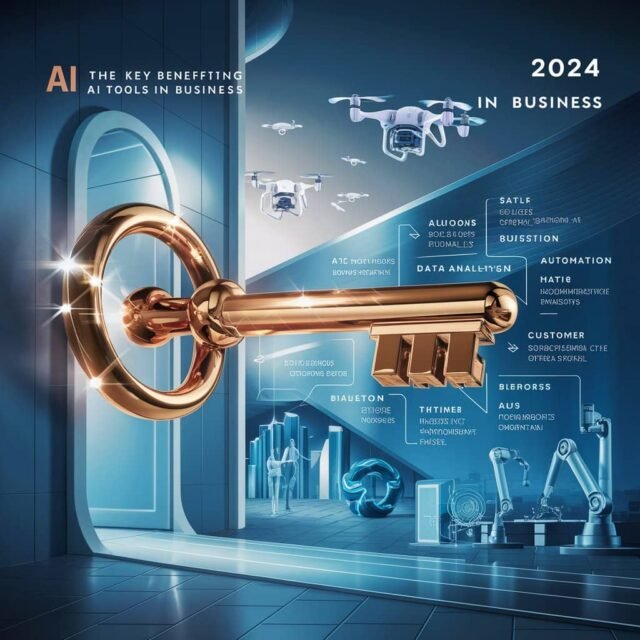Table of Contents
Introduction AI tools in businesses
Artificial Intelligence (AI) has revolutionized the way businesses operate in recent years. From automating repetitive tasks to providing valuable insights from data analysis, AI tools have become indispensable for companies of all sizes and industries. In this blog post, we’ll explore the key benefits that AI tools bring to businesses and how they can drive success in today’s competitive landscape.
1. Increased Efficiency and Productivity
One of the most significant benefits of AI tools in business is the ability to increase efficiency and productivity. AI-powered automation streamlines repetitive tasks, allowing employees to focus on more strategic and high-value activities. For example, AI chatbots can handle customer inquiries and support requests, freeing up human agents to tackle more complex issues. Similarly, AI-driven algorithms can automate data entry, data processing, and other administrative tasks, reducing manual errors and saving valuable time.
The efficiency gains provided by AI tools are substantial. According to a study by McKinsey & Company, AI automation could increase productivity by up to 40% in various industries, leading to significant cost savings and improved operational efficiency.
2. Enhanced Decision Making
AI tools empower businesses to make better-informed decisions by analyzing vast amounts of data and extracting actionable insights. Machine learning algorithms can identify patterns, trends, and correlations within data sets, helping businesses uncover valuable information about customer behavior, market trends, and operational performance.
For example, AI-powered predictive analytics can forecast future sales trends based on historical data, enabling businesses to optimize inventory levels and pricing strategies. Similarly, sentiment analysis algorithms can analyze customer feedback and social media data to gauge customer satisfaction and identify areas for improvement.
By leveraging AI-powered analytics, companies can make data-driven decisions that drive growth, improve efficiency, and mitigate risks.
3. Personalized Customer Experiences
In today’s digital age, customers expect personalized experiences from the businesses they interact with. AI tools enable companies to deliver tailored experiences at scale by analyzing customer data and preferences. For example, AI-powered recommendation engines can suggest products or services based on a customer’s past purchases or browsing history. Similarly, AI chatbots can engage with customers in real-time, providing personalized assistance and support.
Personalization is key to customer satisfaction and loyalty. According to a study by Accenture, 91% of consumers are more likely to shop with brands that provide relevant offers and recommendations. By offering personalized experiences, businesses can increase customer satisfaction, loyalty, and ultimately, revenue.
4. Improved Customer Service
AI-powered chatbots and virtual assistants have transformed customer service operations by providing instant and round-the-clock support to customers. These AI tools can handle routine inquiries, answer frequently asked questions, and even troubleshoot technical issues autonomously.
As a result, businesses can provide faster response times and better support to their customers, leading to higher satisfaction levels and improved retention rates. Additionally, AI tools can analyze customer interactions to identify areas for improvement and enhance the overall customer service experience.
According to a report by Oracle, 80% of businesses plan to use chatbots for customer interactions by 2021. By leveraging AI for customer service, companies can improve efficiency, reduce costs, and deliver superior customer experiences.
5. Cost Savings
Implementing AI tools in business can lead to significant cost savings by automating manual processes, reducing errors, and optimizing resource allocation. For example, AI-driven predictive maintenance can anticipate equipment failures and prevent costly downtime in manufacturing facilities. Similarly, AI-powered inventory management systems can optimize stock levels and minimize waste in retail operations.
By leveraging AI to streamline operations and increase efficiency, businesses can reduce operational costs and improve their bottom line. According to a report by PwC, AI is expected to contribute up to $15.7 trillion to the global economy by 2030, with cost savings being one of the primary drivers of value.
6. Competitive Advantage
In today’s competitive business landscape, staying ahead of the competition is crucial for long-term success. AI tools provide companies with a competitive edge by enabling them to innovate faster, adapt to changing market conditions, and meet evolving customer demands.
Whether it’s using AI to develop new products and services, optimize marketing campaigns, or improve supply chain management, businesses that embrace AI can gain a significant advantage over their competitors. According to a survey by MIT Sloan Management Review, 90% of executives believe that AI will create a competitive advantage for their companies.
7. Scalability and Flexibility
AI tools offer businesses scalability and flexibility to adapt to changing business needs and scale operations as required. Whether it’s scaling customer support to handle increased demand during peak periods or automating repetitive tasks to accommodate business growth, AI can dynamically adjust to fluctuating workloads.
Additionally, AI-powered cloud platforms enable businesses to access computing resources on-demand, allowing for rapid deployment and scalability without the need for large upfront investments in infrastructure.
Scalability and flexibility are essential for businesses to remain agile and responsive in today’s fast-paced environment. By leveraging AI tools, companies can scale operations efficiently and meet the demands of a growing business landscape.
8. Enhanced Security and Risk Management
Cybersecurity threats and data breaches pose significant risks to businesses in today’s digital world. AI tools can help mitigate these risks by detecting and preventing security threats in real-time. Machine learning algorithms can analyze network traffic patterns to identify anomalies and potential security breaches, while AI-powered fraud detection systems can detect fraudulent transactions and activities.
By proactively addressing security threats, businesses can safeguard their assets, protect customer data, and maintain trust and credibility with stakeholders. According to a report by Capgemini, 69% of organizations believe that AI is essential for detecting and responding to cyber threats.



Conclusion AI tools in businesses
The benefits of AI tools in business are vast and varied, ranging from increased efficiency and productivity to enhanced decision making and personalized customer experiences. By leveraging AI technology, businesses can gain a competitive edge, reduce costs, and drive growth in today’s dynamic and ever-changing market.
As AI continues to evolve and mature, its impact on businesses will only continue to grow, making it essential for companies to embrace AI as a fundamental part of their operations.
With the right AI tools and strategies in place, businesses can unlock new opportunities, overcome challenges, and achieve success in the digital age.








